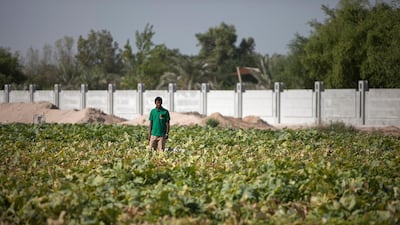At least 20 per cent of all fruit and vegetables consumed in the UAE are now grown locally, it has been revealed.
And supermarkets have reported a surge in sales of locally-grown produce over the past four years.
Exact year to year comparisons are not readily available but the amounts have grown from a low base just a few years ago.
The figure — which do not include date cultivation — was revealed at the launch of a week-long event at Lulu supermarkets that seeks to boost the profile of locally-grown produce.
More than a hundred varieties — including cucumbers, tomatoes, capsicum and zucchini grown at farms across the country with support from the Ministry of Climate Change and Environment — are on sale at shops and markets across the country and include organic products.
Country-wide figures for how much locally-grown produce is sold is not available but the ministry said at least Dh35m was sold during 2018 at Lulu, Carrefour and Union Co-op since a deal was signed to promote locally grown food. But the true figure is thought to be much higher.
_______________
Read more:
High costs force Fujairah farmers to give up growing fruit and vegetables
Local organic produce is becoming more affordable and available, thanks to government scheme
Special report: Al Ain farm tackles food and water security by pairing fish with watermelons
_______________
Thani Al Zeyoudi, Minister of Climate Change and Environment, said he wants to increase the amount grown by 5 to 10 per cent a year. The initiative will boost food security, ensure farmers get a bigger slice of the profits by removing middlemen and will lead to sustainable use of vital water supplies, he said.
“We have issued guidelines, improved awareness and educated farmers about water use,” he told The National. “We are trying to change from conventional irrigation systems to more efficient ways.”
Some farmers are embracing hydroponics — a more efficient system of agriculture that does not need soil — to cut their water use by up to 70 per cent, officials said. There are least 200 hydroponic farms in the UAE now and the ministry is helping those who want to try these techniques.
Major supermarket chains are also reporting a surge in sales. Lulu said that it sold close to Dh4m worth of organic, locally-grown produce during 2018 — a five per cent increase on 2017. This represents about 10 per cent of all organic fruit and vegetables sold its chains here — up from about three per cent a few years ago. One of the most noteworthy initiatives is Zayed Higher Organisation for Humanitarian Care and Special Needs farms. The facility in Bani Yas produces organic vegetables and it employs people with special needs.
“Some expatriates usually buy products from their country so changing their habits is a challenge,” said Lulu’s V Nandakumar. “There were initially a lot of misconceptions about quality and freshness. But we clarified this. They are fresh and we are supporting producers.”
The chain has also pledged to ramp up the amount of locally-grown products on its shelves over the next three years starting with a five per cent rise next year, 10 per cent in 2020 and finally a 15 per cent rise on this by 2021. The price of local fruit and vegetables is roughly the same as other products and the most popular products include capsicum and cucumber.
Part of the deal signed with Lulu on Monday will also see the chain promote UAE products in Oman, Bahrain and Saudi Arabia.
This year, farmers in Fujairah said they had stopped growing fruits and vegetables because desalinated water to irrigate their fields was too costly. Most of water used in the UAE goes toward agriculture and is heavily subsidised. Many aquifers and wells have been depleted through overuse, while desalinated water is also costly
The difficulties facing farmers have cropped up repeatedly in the Federal National Council, with members calling for more efforts to protect them. In response, the ministry launched the current initiative.
“We are keen to support and encourage the efforts of Emirati farmers,” said Mr Al Zeyoudi on Monday.
“The missing link in this endeavour was the proper marketing of their produce, and this is where the ministry has stepped in to help.”


